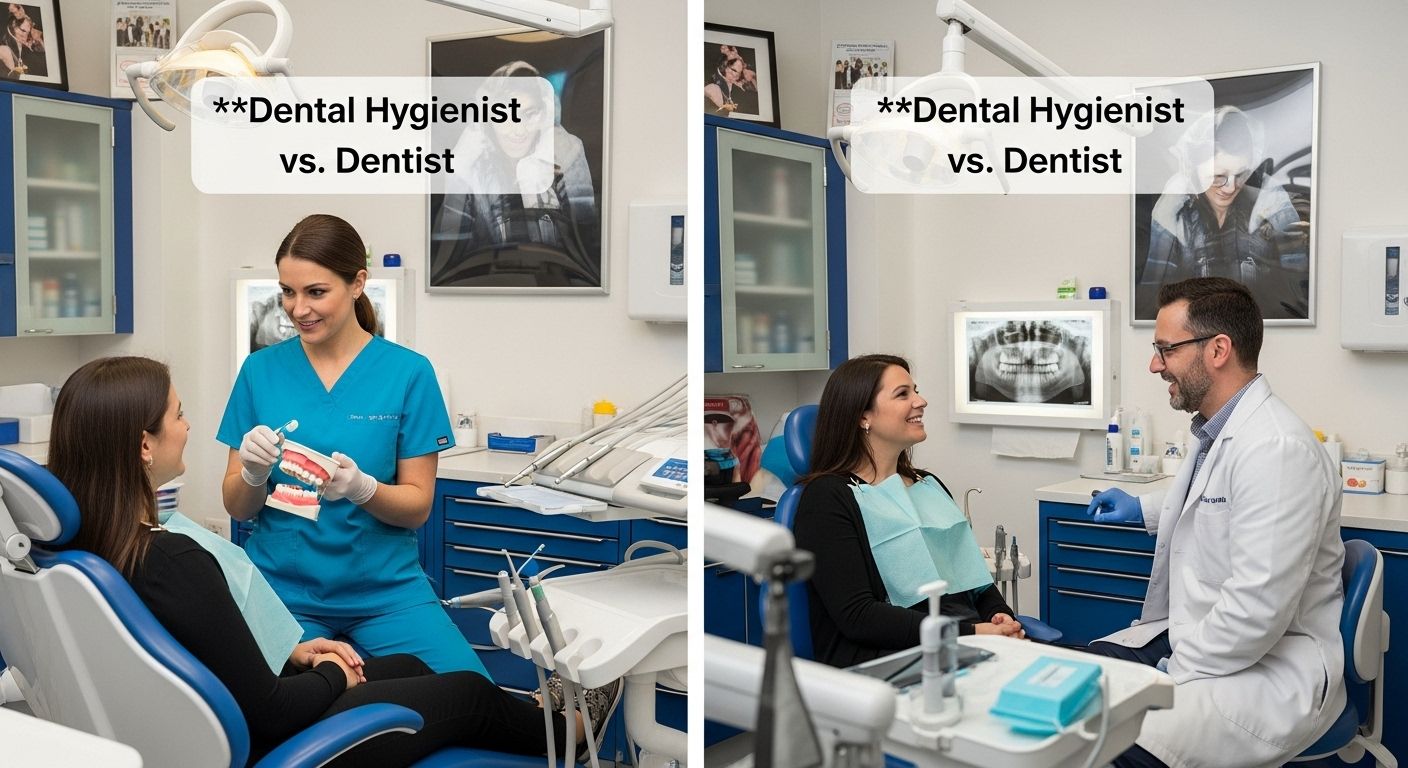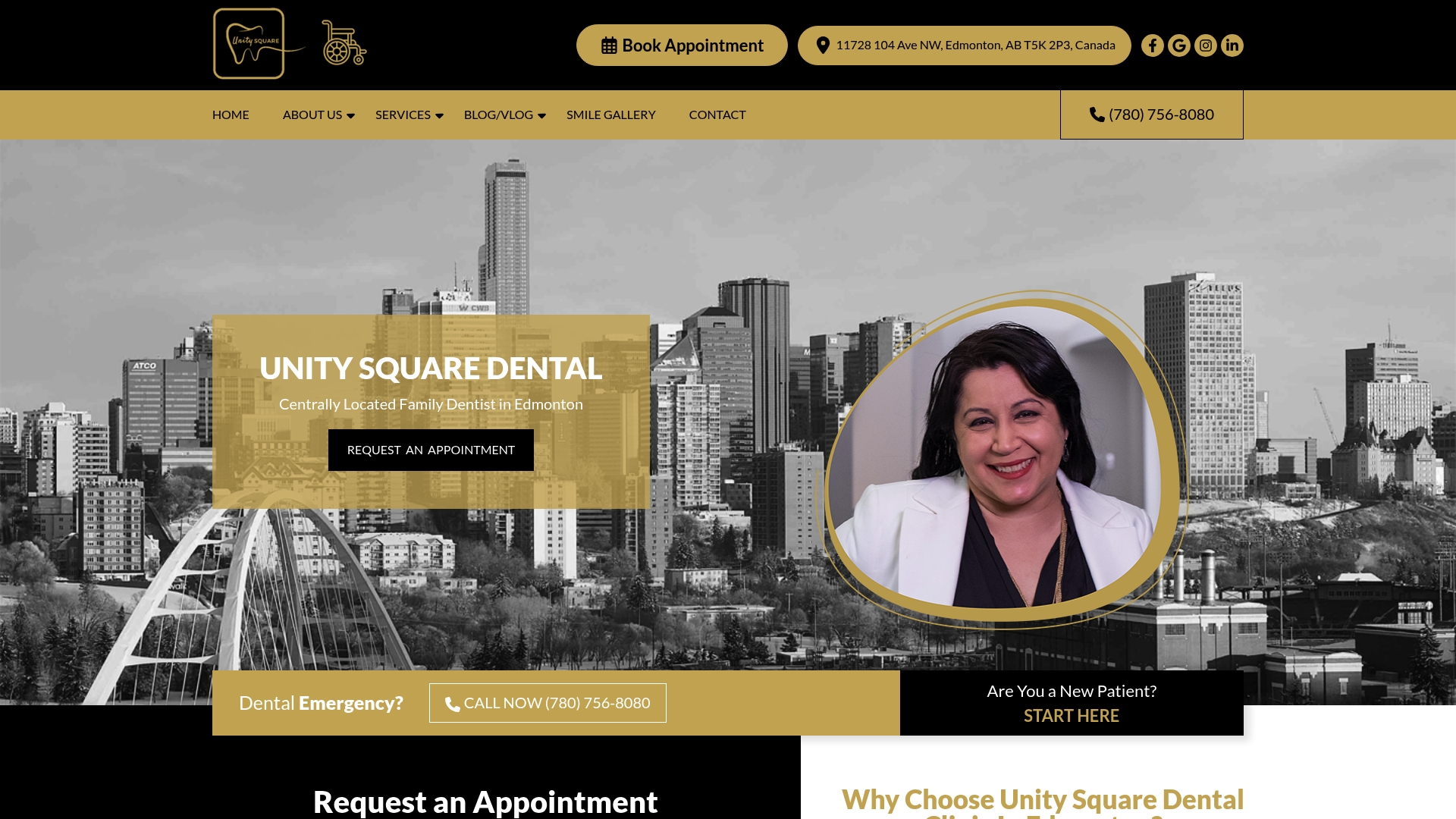
Most people think a dental visit is just about getting your teeth cleaned or having a cavity fixed. But dental professionals handle so much more than that. In fact, dental hygienists use specialized skills to spot early signs of disease during routine cleanings, while dentists are trained to perform complex surgeries and create full treatment plans tailored to you. The real surprise is how their different roles work together to make your next checkup smarter and way more important than you might expect.
Table of Contents
- What Is A Dental Hygienist And What Do They Do?
- Understanding The Role Of A Dentist And Their Responsibilities
- Why Knowing The Difference Matters For Your Dental Care
- How Dental Hygienists And Dentists Work Together In Patient Care
- Key Concepts To Understand About Dental Professions
Quick Summary
| Takeaway | Explanation |
|---|---|
| Dental hygienists focus on preventive care. | Their primary role is to maintain oral health and prevent diseases through screenings, cleanings, and education. |
| Dentists treat complex dental issues. | Dentists perform surgical procedures, diagnose conditions, and create treatment plans for overall oral health management. |
| Both roles require distinct educational paths. | Dental hygienists typically need an associate or bachelor’s degree, while dentists must obtain a doctoral degree and pass licensure exams. |
| Understanding their roles enhances patient care. | Knowing the specific functions of both professionals empowers patients to make informed decisions about their dental treatment. |
| Collaborative care improves overall oral health. | The integrated approach of hygienists and dentists ensures comprehensive treatment tailored to each patient’s needs. |
What is a Dental Hygienist and What Do They Do?
Dental hygienists are specialized healthcare professionals who play a crucial role in maintaining oral health and preventing dental diseases. These trained professionals work closely with dentists to provide comprehensive dental care, focusing primarily on preventive treatments and patient education.
Professional Responsibilities and Scope
A dental hygienist performs a wide range of critical tasks that contribute to overall oral wellness. According to the American Dental Association, their key responsibilities include:
- Conducting patient screening procedures
- Taking and interpreting dental x-rays
- Removing plaque and tartar from teeth surfaces
- Applying preventive materials like fluoride and sealants
- Teaching patients proper oral hygiene techniques
Their role extends beyond routine cleaning. Dental hygienists are trained to identify early signs of oral health issues such as gingivitis, periodontal disease, and potential systemic health problems that manifest through oral symptoms.
Educational Background and Clinical Skills
To become a dental hygienist, professionals must complete a rigorous educational program, typically an associate or bachelor’s degree in dental hygiene. These programs provide comprehensive training in anatomy, physiology, radiography, and advanced clinical techniques. Licensing is mandatory, requiring candidates to pass national and state board examinations to practice.
Their clinical skills are extensive. Dental hygienists use specialized tools to clean teeth, assess oral health, and provide personalized recommendations for maintaining optimal dental wellness. They are crucial in helping patients understand the connection between oral health and overall physical well-being, often serving as the first line of defense in detecting potential dental problems.
The table below compares the roles, responsibilities, and educational backgrounds of dental hygienists and dentists to help readers quickly understand the primary differences between these two key dental professionals.
| Aspect | Dental Hygienist | Dentist |
|---|---|---|
| Main Focus | Preventive care and patient education | Diagnosis, treatment, and surgical procedures |
| Typical Procedures | Cleanings, screenings, applying sealants/fluoride | Fillings, root canals, crowns, dental surgery |
| Level of Education | Associate or Bachelor’s degree in Dental Hygiene | Doctoral degree (DDS or DMD) |
| Licensing Requirements | National and state board exams | National and state board exams |
| Patient Interaction | Frequent, especially for routine care and education | Varies; in-depth during diagnosis and treatment planning |
| Scope of Practice | Preventive and assessment tasks | Comprehensive oral health management |
| Role in Patient Care | First line of defense, early detection | Advanced intervention, comprehensive treatment planning |
Understanding the Role of a Dentist and Their Responsibilities
Dentists are highly trained medical professionals who specialize in diagnosing, treating, and preventing oral health conditions. These experts play a critical role in maintaining overall health by addressing complex dental issues and providing comprehensive care for patients of all ages.
Core Professional Responsibilities
The scope of a dentist’s work extends far beyond simple tooth treatments. According to the U.S. Bureau of Labor Statistics, dentists perform a wide range of essential medical tasks:
- Conducting comprehensive oral examinations
- Diagnosing dental and oral health conditions
- Performing surgical and restorative procedures
- Creating treatment plans for patients
- Interpreting diagnostic imaging like x-rays
Their expertise allows them to identify potential systemic health issues that might first manifest through oral symptoms, making their role crucial in preventative healthcare. Dentists use advanced diagnostic tools and techniques to assess patients’ overall oral wellness and develop personalized treatment strategies.
Advanced Clinical Skills and Specialized Treatments
Beyond routine dental care, dentists are trained in multiple specialized areas. They can perform complex procedures such as root canals, dental implants, orthodontic interventions, and cosmetic dental reconstructions. Specialized dental treatments require extensive knowledge of dental anatomy, advanced surgical techniques, and patient management.
Professional dentists also play a critical patient education role. They guide individuals on proper oral hygiene practices, diet recommendations that support dental health, and preventative strategies to minimize future dental complications. Learn more about essential dental care questions to enhance your understanding of comprehensive dental health management.
Why Knowing the Difference Matters for Your Dental Care
Understanding the distinct roles of dental hygienists and dentists is crucial for managing your oral health effectively. These professionals work collaboratively, each bringing unique skills and expertise to ensure comprehensive dental care that goes beyond simple tooth maintenance.
Complementary Professional Roles
Dental hygienists and dentists are not interchangeable professionals, but rather complementary healthcare providers. According to research published in oral health journals, their collaborative approach ensures patients receive thorough, multifaceted dental treatment:

- Preventive care from dental hygienists
- Diagnostic and treatment services from dentists
- Comprehensive health monitoring
- Personalized oral wellness strategies
- Efficient referral and treatment coordination
Knowing which professional to consult can save time, reduce unnecessary procedures, and optimize your overall dental health management. Dental hygienists focus on preventative care and early intervention, while dentists handle complex medical treatments and surgical procedures.

Patient Empowerment Through Understanding
Recognizing the specialized skills of each dental professional empowers patients to make informed healthcare decisions. Explore essential questions to ask during dental consultations to maximize your understanding and engagement with your oral health team.
By understanding their unique roles, patients can proactively manage their dental care, schedule appropriate appointments, and develop a more comprehensive approach to oral wellness. This knowledge helps individuals navigate their dental health journey more confidently, ensuring they receive the most appropriate care at the right time from the right professional.
How Dental Hygienists and Dentists Work Together in Patient Care
The relationship between dental hygienists and dentists represents a sophisticated, integrated approach to comprehensive oral healthcare. Their collaborative model ensures patients receive thorough, personalized treatment that addresses both preventive and corrective dental needs.
Integrated Care Workflow
According to research exploring interprofessional healthcare collaboration, dental hygienists and dentists function as a coordinated team with distinct yet complementary responsibilities:
- Initial patient screening and assessment
- Comprehensive oral health documentation
- Developing personalized treatment strategies
- Implementing preventive and corrective procedures
- Continuous patient education and monitoring
Effective communication and seamless patient handoff are critical components of their collaborative practice. Dental hygienists typically conduct initial examinations, clean teeth, and provide preventive care, while dentists diagnose complex conditions and perform advanced surgical interventions.
Comprehensive Patient Support
Their partnership extends beyond individual treatments. Dental hygienists often serve as the first point of contact, gathering critical patient information and performing preliminary assessments. Learn more about common dental procedures to understand how these professionals coordinate care.
This integrated approach allows for more efficient, holistic patient care. By combining the preventive expertise of dental hygienists with the diagnostic and surgical skills of dentists, patients receive a comprehensive oral health management strategy that addresses both immediate concerns and long-term wellness goals.
Key Concepts to Understand About Dental Professions
Dental healthcare encompasses a complex network of specialized professionals working together to ensure comprehensive oral health management. Understanding the nuanced roles and educational requirements of these professionals helps patients make informed decisions about their dental care.
Educational and Professional Pathways
According to the U.S. Bureau of Labor Statistics, dental professionals follow distinct educational and licensing trajectories:
- Dental Hygienists: Typically require an associate or bachelor’s degree
- Dentists: Require a doctoral-level degree (DDS or DMD)
- Both professions mandate specific licensing examinations
- Continuing education is crucial for maintaining professional credentials
- Specialization options exist for advanced practice
Professional development and ongoing training distinguish these roles, ensuring patients receive high-quality, current dental care. The depth of education directly correlates with the complexity of procedures each professional can perform.
Scope of Practice and Patient Interaction
Each dental professional has a clearly defined scope of practice that determines their clinical responsibilities. Explore common dental procedures to understand these distinctions and how different professionals contribute to patient care.
While their roles differ, dental hygienists and dentists share a fundamental commitment to oral health. Dental hygienists focus on preventive care, patient education, and initial assessments, whereas dentists diagnose complex conditions, develop comprehensive treatment plans, and perform advanced surgical interventions. Their collaborative approach ensures patients receive thorough, personalized dental healthcare.
Confidently Choose the Right Dental Expert for Your Needs
Still unsure whether your dental concern needs the preventive focus of a hygienist or the advanced care of a dentist? The difference can shape your entire oral health experience. At Unity Square Dental, our highly trained team understands how confusing these distinctions can feel. Our clinic offers both compassionate dental hygienists and skilled dentists, all working together to provide seamless, personalized care whether you are looking for routine cleanings or complex treatments.

Take control of your dental health today. See how our friendly Edmonton clinic combines expertise, advanced technology, and truly accessible care for all ages. Book your visit now for the guidance and services you deserve. Discover more about our approach to general dentistry and preventive care so you can make confident choices for your smile. Secure your spot with our convenient appointment request and experience the Unity Square Dental difference right away.
Frequently Asked Questions
What is the primary role of a dental hygienist?
A dental hygienist focuses on preventive dental care, including conducting patient screenings, cleaning teeth, applying fluoride treatments, and educating patients on proper oral hygiene practices.
How does a dentist’s role differ from that of a dental hygienist?
While dental hygienists emphasize prevention and education, dentists diagnose and treat complex dental issues, perform surgeries, and create comprehensive treatment plans for their patients.
Do dental hygienists and dentists work together?
Yes, dental hygienists and dentists collaborate closely in providing comprehensive dental care, where hygienists focus on preventive measures and initial assessments, while dentists handle more complex medical treatments.
What educational requirements must one meet to become a dental hygienist or dentist?
Dental hygienists typically need an associate or bachelor’s degree in dental hygiene, whereas dentists must earn a doctoral degree, such as a DDS or DMD, and pass licensing examinations.
Recommended
- Understanding the Importance of Dental Cleanings in Edmonton: 2025 Guide – Unity Square Dental
- Teeth Cleaning vs Whitening: Guide for Edmonton Families 2025 – Unity Square Dental
- Essential Questions to Ask Your Dentist for Better Care – Unity Square Dental
- Understanding Frequently Asked Dental Questions – Unity Square Dental

